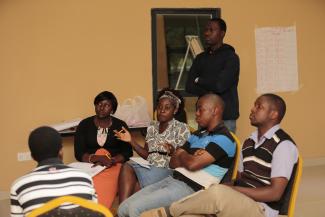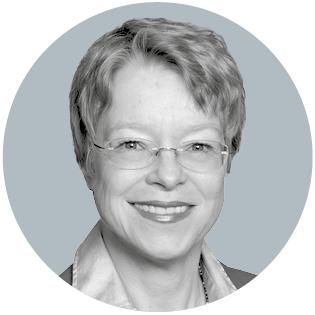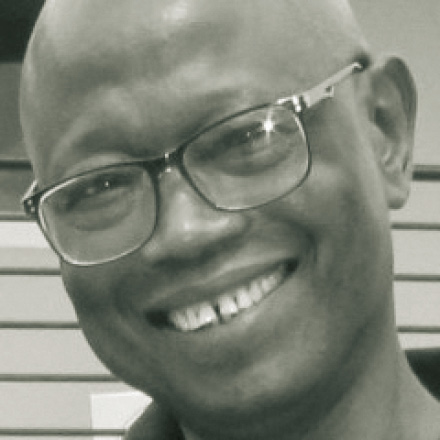Participation in public life
“Voice is fine – but needs to be heard”
 Blackwood Studios
Blackwood Studios
What is the typical situation of young people in Africa in regard to employment opportunities and participation in public affairs?
Every year about 9 million young people enter Africa’s labour market. High unemployment, coupled with high school drop-out rates, is prevalent in most African countries. More than 50 % of Africa’s youth are illiterate. Without education, a decent job and prospect of a meaningful future, many young people feel excluded. Social risks arise from this situation. The long-term marginalisation of African youth as enshrined in our culture, where seniority is equated with wisdom, plays a negative role too.
What can be done to improve matters?
African governments and the African Union (AU) should give school drop-outs a second chance through adult education. Continued investment in educational infrastructure and students’ support is crucial. Young people themselves must be more proactive, seek knowledge and build their own capacities. Networking with peers to share experiences and volunteering in order to develop skills can be helpful.
Your flagship event, the African Youth and Governance Conference (AYGC), was held in Zambia last year. Why did you not stay in Ghana?
The conference was meant to be Africa-wide from the beginning. But in the first five years, when the AYGC was held in Accra, 60 % to 70 % of the delegates came from West African countries. For continental relevance, extension to other African regions was needed. YBF’s brand new branch in Zambia opened us the doors to the Southern African region. Additionally, it was fruitful to try something new.
What have you done differently?
We introduced a number of new approaches in Lusaka, for example:
- The conference started with team-building activities in small groups, thus enabling the delegates to form strong and cohesive teams for the technical sessions that followed.
- We established committees along topics of interest. They were headed by young people who were trained before the conference. The committees had to develop resolutions, present them to the general assembly and defend them in a plenary debate.
- We added sessions where experts provided deeper insights on relevant topics. Without such knowledge, discussions were previously at risk of being a bit shallow. For example, we had a director of the Ghanaian Ministry of Foreign Affairs supporting the committee on foreign relations and a representative from the African University for Sanitation and Waste Management in Ghana for the committee on environment.
The resolutions the groups came up with were useful for post-conference advocacy. We sent the statements to the Ministry of Foreign Affairs of Ghana received by the deputy foreign minister, to our international development partners and to many companies throughout Africa.
What are your demands?
One of the key demands is for the AU to have a youth commission with its own budget. In regards to education, the delegates call on African governments to ensure access to quality education at all levels for people with disabilities. They also want their governments to provide free and high quality education up to high school level. That should be a priority for the countries’ national agendas and included in their budgets.
It sounds like the conference was a big success. Did you have any difficulties organising a large event like that far away from home?
It was a big challenge. We had to work in a new context, train a local team, leave behind good cooperation with sponsors in Ghana and sell the concept to Zambian companies. Unfortunately, we had to leave behind a large number of followers from West Africa who were unable to afford the airplane tickets.
Was it a mistake to go to Zambia?
No, I am still happy we moved. With the new concept we improved content. The smaller number allowed our work to become more intensive. We are excited to take the AYGC to Johannesburg this year.
In early 2014, YBF was Co-organiser of the Euro-African Youth parliament (EAYP) in Berlin. What was that about?
The idea of this innovation was to bring together two similar events: our African Youth and Governance Conference and the European Youth Parliament (EYP). We wanted a transcontinental youth debate on issues concerning young people. The conference was funded by Germany’s Federal Ministry for Economic Cooperation and Development.
So how did the peer to peer approach work out?
Participants from 21 African and 30 European countries were present at the EAYP. Such cross-cultural interaction always comes with stepping on toes. Often young, well-educated people tend to neglect differences in a “we are all humans”-attitude, cultivating a “we have no prejudices at all”-image of themselves. But cross-cultural clashes are real, and of course there were some in Berlin.
What needs to be done?
Orientation and reflection are crucial. In order to facilitate the process of accepting each other and finding common ground, the participants of the conference worked in teams. They supported each other in those small groups, thus bridging Euro-African gaps. In the future, the same people may be sitting in meetings at AU-EU level – and they have already crossed that bridge! In Berlin, we gained a lot of new ideas about the organisation of youth debates. I would also like to mention the fantastic collaboration with the organisers. No party tried to impose their will on the other. There was no kind of “We have done it for years, so we know”-attitude.
What are you doing in Ghana to mobilise yet more African youth to participate in the continent’s development?
Well, we have introduced an e-participation platform called Ybridge. During the pilot phase, it is running in four districts. Ybridge is based on tools for virtual debates and decision making by the German association “Liquid Democracy”, which were adapted to our structure of local governance in Ghana. Youth in the pilot communities can put forward topics they want to discuss with others, then debate among themselves and finally vote on a proposal. Proposals can then be submitted to political leaders, for instance in district assemblies.
So YBF is giving a voice to the youth.
Voice is fine – but it needs to be heard too. The youth want to be listened to by the assembly men and women. So we do our best to sensitise those officials and win their support.
Is the e-platform accepted? Do young people use it?
The involvement and responsiveness of assembly members and members of the Ghanaian parliament is critical. It is important that our initiative fits into the national e-governance agenda. We want to have youth considered in the national development plan. We are happy about the commitment the Ministry of Information displayed when Ybridge started and about its lasting interest in our work. The major obstacle, however, is that we do not have wide internet connectivity in Ghana. To involve users in rural areas, a mobile-phone version would be excellent. This year will show if we can make Ybridge take off. In future, this tool should serve as a platform for our international networking, for instance for the preparation and post conference advocacy of the AYGC.
Seth Oteng is the founder and director of the Youth Bridge Foundation (YBF).
soteng@youthbridgefoundation.org
Links:
Youth Bridge Foundation:
http://www.youthbridgefoundation.org
E-participation platform Ybridge:
https://ybridge.ypart.eu/instance/ybridge


